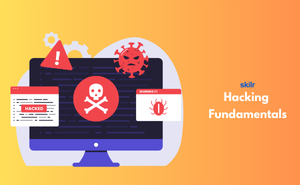👇 CELEBRATE CLOUD SECURITY DAY 👇
00
HOURS
00
MINUTES
00
SECONDS

Hacking Fundamentals is the foundation of understanding computer security and how intruders might try to break into systems. Instead of focusing on harmful activities, it teaches how to think like a hacker in order to defend against one. Learners explore the mindset, methods, and tools used in hacking so they can better protect information and technology.
Through this certification, participants gain a strong starting point in ethical hacking. They will study real-world examples of cyber risks and learn defense methods that professionals use every day. It sets the stage for advanced cybersecurity learning and opens the door to job opportunities in protecting digital systems.
This exam is ideal for:
Domain 1 - Introduction to Hacking
Domain 2 - Types of Hackers and Attacks
Domain 3 - Networking Basics for Hacking
Domain 4 - System Vulnerabilities
Domain 5 - Tools of Ethical Hacking
Domain 6 - Defensive Strategies
Domain 7 - Future Learning Path
Industry-endorsed certificates to strengthen your career profile.
Start learning immediately with digital materials, no delays.
Practice until you’re fully confident, at no additional charge.
Study anytime, anywhere, on laptop, tablet, or smartphone.
Courses and practice exams developed by qualified professionals.
Support available round the clock whenever you need help.
Easy-to-follow content with practice exams and assessments.
Join a global community of professionals advancing their skills.
It includes both theoretical concepts and tool introductions.
Phishing, malware, denial of service, password cracking, and more.
Cybersecurity, IT support, networking, and system administration.
No, only basic IT and networking knowledge is needed.
No, it focuses only on ethical hacking and defensive techniques.
Only basic concepts and tool introductions, not advanced testing.
Beginners in cybersecurity, IT professionals, and students interested in ethical hacking.
Yes, networking basics and protections are part of the curriculum.
Yes, it’s perfect for students pursuing IT or computer science.
It builds the foundation required for advanced certifications and entry-level roles.
Yes, the fundamentals of responding to cyber threats are included.
Advanced courses like Certified Ethical Hacker (CEH) or penetration testing training.
Yes, it provides awareness of cyber risks useful for managers, business owners, and anyone working with digital systems.
Yes, you’ll be introduced to basic ethical hacking tools.
Not mandatory, but helpful for advanced learning later.